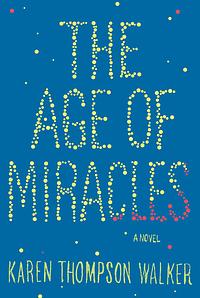Take a photo of a barcode or cover
This is not a book that would typically interest me but I really enjoyed it.
fantastic book! wonderful writing, emotional, sci-fi, cautionary tale. highly recommended.
Interesting story, it really made me think about the science of our world.
adventurous
tense
slow-paced
Plot or Character Driven:
Character
Strong character development:
Complicated
Loveable characters:
Yes
Diverse cast of characters:
Complicated
Flaws of characters a main focus:
No
I absolutely loved this book! It would have been a one day read if I didn't have to work. The creativity of the main story line (consequences of the earth's rotation slowing)was unique and addicting. The author did a wonderful job developing the characters in a way you were drawn into their lives and cared about what was happening to them. I could see so much of myself in the narrator Julia. As I got closer to the end, I became a little scared of how the story would close. If a book ends badly the entire novel is ruined for me no matter how much I enjoyed it. The ending was as awesome as the rest of the novel. I cannot wait to read her next book!
The title of this extraordinary novel denotes both the metaphorically earth-shaking transformations of puberty and the literally earth-shaking transformations of environmental collapse. Earth's rotation begins to slow, first subtly, then dramatically, lengthening days and nights at a rate too fast for the environment to smoothly adapt. "But no force on earth could slow the forward march of sixth grade," (166) writes Julia, whose coming of age experiences develop with the average fits and starts of American adolescents, despite the real possibility that there may soon not be a world to come of age into. The writing is consistently beautiful, and the portrayal of a planet spinning past the tipping point of catastrophe is vivid and frightening (especially so during this unprecedentedly scorching summer). The narration is filled with concise nuggets of psychological insight, such as this description of Julia's grandfather: "Of my grandfather's eighty-six years on the planet, he had lived two of them in Alaska, working in gold mines and, later, on various fishing boats. But those two years had expanded, sponge-like, in his memory, overtaking much of the rest. Whole decades had passed in California without producing a single worthy anecdote." (140) That's a description of the workings of the mind that wouldn't be out of place in Proust, I dare say. The novel has hundreds of evocative passages like this, making it one of the best written books I've had the pleasure of reading in years.
I don't really know what I felt about this book, only to say that it wasn't what I first thought it would be, and I felt like it couldn't decide if it was a coming of age tale, a tale of dysfunctional families, or an apocalyptic tale. Meh.
When the world ends not with a devastating disease, natural catastrophe, but with an unexplained and painfully slow process what would you do? Julia was eleven when the Slowing began. On a normal Saturday morning, sunrise did not arrive when expected. It took hours for scientists to realize what was happening. By the end of the week, a day was no longer twenty-four hours, but twenty-five and counting. Over the next months and years, a day grew into over sixty plus hours long.
The devastation was slow, unstoppable, and world-ending, but life had to go on. Told by adult Julia through her memories of that time, we follow through a tween's perspective and focus as the days get longer, too much sunlight begins to cause disease and dementia, the birds die-off, plants begin to die in slow jumps and starts, and people come to grips with a new reality of the world most likely becoming the next Mars.
The devastation was slow, unstoppable, and world-ending, but life had to go on. Told by adult Julia through her memories of that time, we follow through a tween's perspective and focus as the days get longer, too much sunlight begins to cause disease and dementia, the birds die-off, plants begin to die in slow jumps and starts, and people come to grips with a new reality of the world most likely becoming the next Mars.
Different than a lot of the books I have read and really enjoyed it




